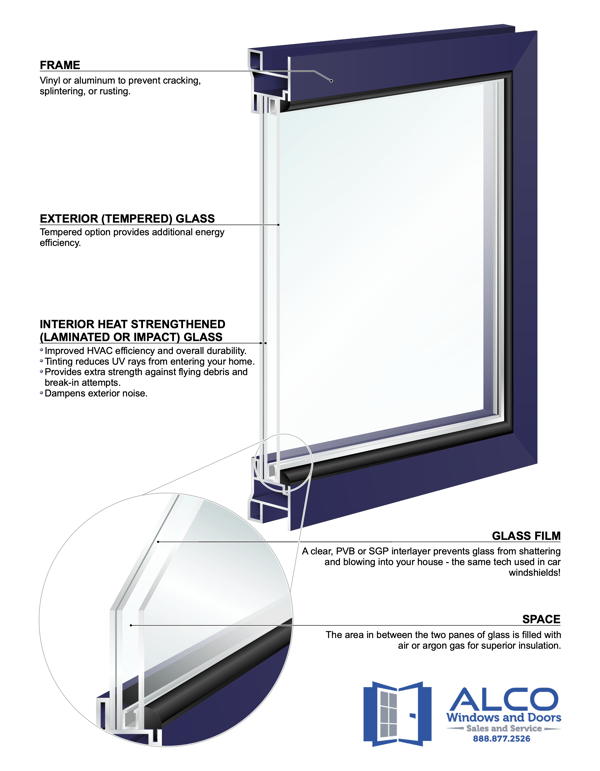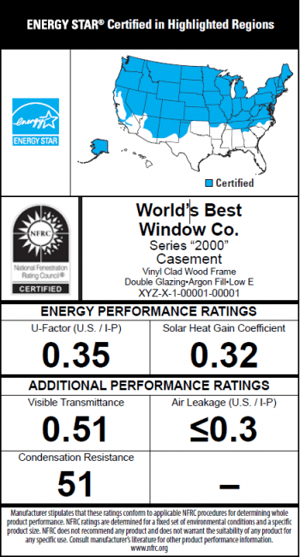Once the wind of a hurricane or severe storm gets inside a house, the home’s structure (even the roof!) most likely will not survive. The pressure that builds up causes a separation of materials within the structure. This process can cause total structure devastation in just a matter of minutes.
The damage a hurricane can cause to a home is unimaginable to many who have never faced such an event. For Florida property owners, the realities of devastating hurricanes isn't a matter of if - but when. For this reason, property owners should give serious consideration to installing hurricane impact windows and doors.
While impact products are a great investment, the accompanying rating system can be confusing – especially for first-time buyers. To help provide more insight, Alco Windows and Doors explains how impact-resistant windows are rated to ensure you make the right purchase.
Learn More About Impact Windows:
- Your Complete Guide to Impact Windows
- Do I Need Impact-Resistant Windows? A Quick Guide for Homeowners
- 5 Questions to Ask BEFORE Hiring An Impact Windows Installer
How Impact Windows Differ from Traditional Options

Impact windows receive superior ratings for their dual-layered glass and reinforced framing. They are built with both tempered and laminated glass that is close to impossible to break. Damage to glass reacts in the same way car windows do - by creating a spider-web crack. This prevents shards of harmful glass from blowing into one's home during high-wind events.
In the unlikely event impact glass breaks, the material simply shatters into small pebbles, reducing the chance of injury. By contrast, traditional windows feature "float glass" which easily breaks into large, sharp pieces upon impact.
Additionally, impact products undergo rigorous testing to ensure they can effectively protect a home from extreme water pressure, forceful winds, and structural damage. The same cannot be said of traditional options.
Due to their many benefits over traditional windows, impact windows may actually be required in your area. To learn if impact windows are required in your area, read this blog post by our leading impact product experts.

Why Different Window Ratings?
Just like each homeowner is different, so are their wants and needs. A South Florida homeowner will likely require impact-resistant windows because they live in areas susceptible to severe hurricanes.
A homeowner residing in Massachusetts may only be interested in impact windows to improve their property’s energy efficiency. This diversity of needs is why different window ratings exist. They help customers find the perfect window for their specific preferences and area requirements.
Understanding Design Pressure (DP) Rating
Design pressure (DP) rating is perhaps the most common and widely used rating you'll see on impact products. It is a numerical value used to identify a window’s capability to withstand wind pressure and water penetration.
The pressure testing to identify a window’s DP rating is based on three different components including:
- Water infiltration
- Air infiltration
- Structural load
The higher the design pressure rating, the greater resistance a window can endure. For instance, a window with a DP rating of 50 has passed structural load testing of 75 pounds per square feet, or 200 mph winds. Whereas a window with a DP rating of 35 can only withstand 50 pounds per square feet, or 125 mph winds.
Performance Grade (PG) Rating
A design pressure rating must meet only 2 of the 3 tested components. As a result, the performance grade (PG) rating was invented to allow for more accurate measurements of efficiency. It is the superior rating scale.
Impact-resistant windows with a PG rating must meet all three of the criteria referenced above (water infiltration, air infiltration, and structural load).
Wind Scale Ratings
Hurricanes are given a rating of 1 through 5, based on their sustained wind speed. For example, a Category 1 hurricane is one with sustained winds of 74 to 95 mph, where a Category 5 hurricane has sustained winds of 157 mph or higher. A window’s wind scale rating reflects its ability to withstand different levels of high-speed winds.
Solar Heat Gain Coefficient (SHGC)
Solar heat gain coefficient (SHGC) is a numerical value that identifies how much solar radiation passes through impact windows and doors and into a home. A lower number, such as .30 to .60 means the window does a greater job of blocking solar energy from coming into your home.
Thermal Properties
Like most ratings, understanding thermal properties in windows and doors can be tricky. There are several common terms seen on the reading stickers of window models that speak to specific capabilities.
Common thermal properties of impact windows include:
- Thermal conductivity
- R-Value
- U-Factor
- Solar heat gain coefficient (SHGC)
- Air leakage
- Visible transmittance
- Light-to-solar gain
- Condensation resistance
Alco further defines these terms in plain language, here.
In short, the importance of these properties is based on your home’s unique needs. For instance, if you are looking for more energy-efficient windows, then install windows with NRFC labeling. However, if your home requires windows with minimal air leakage, then you will need to dig deeper into these ratings.
The Importance of Reading the Fine Print
Before having impact windows installed in your home, make sure that you know how they are tested and the rating they have received. For example, because a DP rating must meet only 2 of the 3 tested components, some misleading impact product installers take advantage of this process by only sharing the higher DP rating. Doing so exaggerates and misrepresents the effectiveness of their windows.
Also, certain locations such as South Florida have additional testing requirements for impact-resistant windows. In addition to the air, water, and structural evaluations, impact windows must be tested for impact resistance. This test is done by firing a 2x4 piece of wood twice to see if the window successfully holds.
For this reason, it is always important to read the fine print before choosing a type of impact product and installer. The experts at Alco Windows and Doors are available to answer any questions you may have concerning impact window ratings. Contact our team by calling (305) 376-7205 today or schedule a FREE consultation online today!





 License # CGC1526312
License # CGC1526312
Leave a Reply